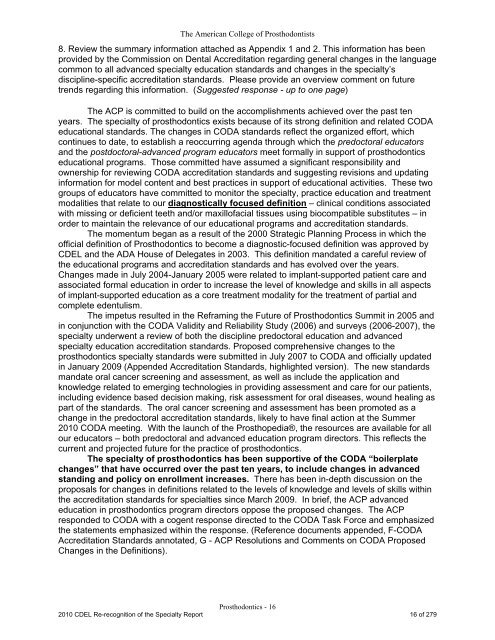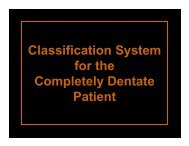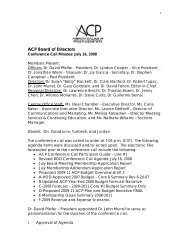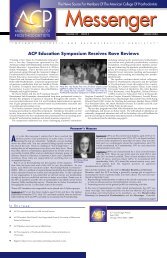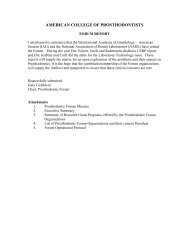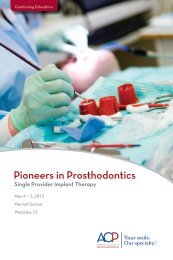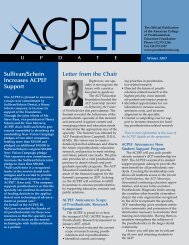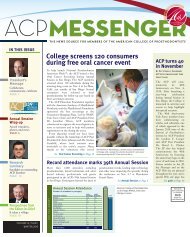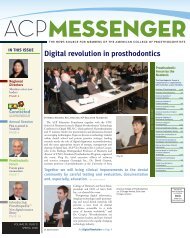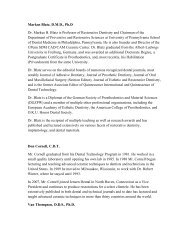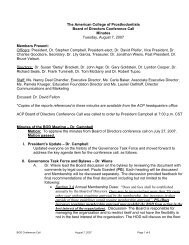PROSTHODONTICS - American College of Prosthodontists
PROSTHODONTICS - American College of Prosthodontists
PROSTHODONTICS - American College of Prosthodontists
Create successful ePaper yourself
Turn your PDF publications into a flip-book with our unique Google optimized e-Paper software.
The <strong>American</strong> <strong>College</strong> <strong>of</strong> <strong>Prosthodontists</strong>8. Review the summary information attached as Appendix 1 and 2. This information has beenprovided by the Commission on Dental Accreditation regarding general changes in the languagecommon to all advanced specialty education standards and changes in the specialty’sdiscipline-specific accreditation standards. Please provide an overview comment on futuretrends regarding this information. (Suggested response - up to one page)The ACP is committed to build on the accomplishments achieved over the past tenyears. The specialty <strong>of</strong> prosthodontics exists because <strong>of</strong> its strong definition and related CODAeducational standards. The changes in CODA standards reflect the organized effort, whichcontinues to date, to establish a reoccurring agenda through which the predoctoral educatorsand the postdoctoral-advanced program educators meet formally in support <strong>of</strong> prosthodonticseducational programs. Those committed have assumed a significant responsibility andownership for reviewing CODA accreditation standards and suggesting revisions and updatinginformation for model content and best practices in support <strong>of</strong> educational activities. These twogroups <strong>of</strong> educators have committed to monitor the specialty, practice education and treatmentmodalities that relate to our diagnostically focused definition – clinical conditions associatedwith missing or deficient teeth and/or maxill<strong>of</strong>acial tissues using biocompatible substitutes – inorder to maintain the relevance <strong>of</strong> our educational programs and accreditation standards.The momentum began as a result <strong>of</strong> the 2000 Strategic Planning Process in which the<strong>of</strong>ficial definition <strong>of</strong> Prosthodontics to become a diagnostic-focused definition was approved byCDEL and the ADA House <strong>of</strong> Delegates in 2003. This definition mandated a careful review <strong>of</strong>the educational programs and accreditation standards and has evolved over the years.Changes made in July 2004-January 2005 were related to implant-supported patient care andassociated formal education in order to increase the level <strong>of</strong> knowledge and skills in all aspects<strong>of</strong> implant-supported education as a core treatment modality for the treatment <strong>of</strong> partial andcomplete edentulism.The impetus resulted in the Reframing the Future <strong>of</strong> Prosthodontics Summit in 2005 andin conjunction with the CODA Validity and Reliability Study (2006) and surveys (2006-2007), thespecialty underwent a review <strong>of</strong> both the discipline predoctoral education and advancedspecialty education accreditation standards. Proposed comprehensive changes to theprosthodontics specialty standards were submitted in July 2007 to CODA and <strong>of</strong>ficially updatedin January 2009 (Appended Accreditation Standards, highlighted version). The new standardsmandate oral cancer screening and assessment, as well as include the application andknowledge related to emerging technologies in providing assessment and care for our patients,including evidence based decision making, risk assessment for oral diseases, wound healing aspart <strong>of</strong> the standards. The oral cancer screening and assessment has been promoted as achange in the predoctoral accreditation standards, likely to have final action at the Summer2010 CODA meeting. With the launch <strong>of</strong> the Prosthopedia®, the resources are available for allour educators – both predoctoral and advanced education program directors. This reflects thecurrent and projected future for the practice <strong>of</strong> prosthodontics.The specialty <strong>of</strong> prosthodontics has been supportive <strong>of</strong> the CODA “boilerplatechanges” that have occurred over the past ten years, to include changes in advancedstanding and policy on enrollment increases. There has been in-depth discussion on theproposals for changes in definitions related to the levels <strong>of</strong> knowledge and levels <strong>of</strong> skills withinthe accreditation standards for specialties since March 2009. In brief, the ACP advancededucation in prosthodontics program directors oppose the proposed changes. The ACPresponded to CODA with a cogent response directed to the CODA Task Force and emphasizedthe statements emphasized within the response. (Reference documents appended, F-CODAAccreditation Standards annotated, G - ACP Resolutions and Comments on CODA ProposedChanges in the Definitions).Prosthodontics - 162010 CDEL Re-recognition <strong>of</strong> the Specialty Report 16 <strong>of</strong> 279


